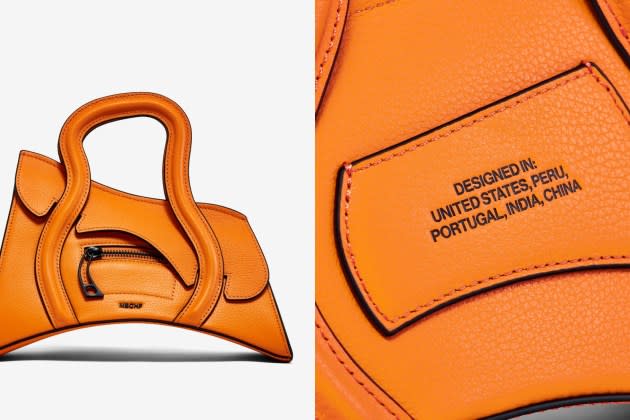How Mschf Combined Iconic Hermès, Dior, Balenciaga and Celine Silhouettes for Its ‘Global Supply Chain Telephone’ Handbag

All the world’s a global supply chain to Kevin Wiesner and Lukas Bentel, co-chief creative officers of the viral art collective, Mschf.
“I think a lot of people are tapped into [the global supply chain] without realizing the degree to which they’re tapped into it,” Wiesener exclusively told WWD. “Even just the fact that I could set up a drop shipping business tomorrow if I wanted to. That’s me using the one tool that connects us all, the global supply chain.”
More from WWD
Rihanna Releases Unexpected Fenty Beauty ‘Ketchup or Makeup’ Lip Collection
EXCLUSIVE: Lele Sadoughi Debuts First Bridal Accessories Collection

This one tool is the center of Mschf’s latest release: the Global Supply Chain Telephone Handbag. Retailing for $650 on globalsupplychaintelephone.com starting Feb. 21, the surrealist satchel is a mashup of popular designer silhouettes including the Hermès Birkin, the Dior Saddlebag and Celine’s Luggage tote.
To achieve the handbag’s unique design, Wiesner and Bentel sent intentionally vague instructions to four leather-working factories around the globe. Many prototypes were produced, but only one made the final cut.
“The goal here was to have all the creative decisions made by the factory and remove us from the process as much as possible,” Wiesener said. “That happens when there aren’t specifications from the design side, the client side in this case, so we tried to cosplay as the worst possible client for the factories that we were working with.”
Initially, they sent an image of a Birkin to a factory in Peru. After a prototype was made, it was mailed to a factory in Portugal, where they were instructed to make the bag resemble a Celine Luggage tote. This game of telephone continued with factories in India and China, who were each asked to incorporate features of Dior’s Saddlebag and Balenciaga’s Hourglass, respectively.

“Those four [designer] bags are part of the iconic canon of handbags, and so it felt like good material to play with,” said Bentel. “I also think they were designs that the factories recognized.”
Mschf, whose releases span miscellaneous products including food, cologne and trading cards, has previously dabbled in making handbags. The brand’s first, a brown leather “Made in Italy” tote, is manufactured in the town of Italy, Texas. Last year, Mschf 3D printed a Louis Vuitton replica smaller than a grain of sea salt. The microscopic accessory fetched $63,000 at auction.
Materialism, particularly among the fashion crowd, has been ideal fodder for the art collective. In 2021, Mschf flayed Hermès bags to create $76,000 “Birkinstock” sandals, while their 2022 “OnlyBags” drop resold designer shopping bags for $40 a pop.
With the Global Supply Chain Telephone handbag, however, Mschf doesn’t intend to lampoon the rag trade, but rather, shine a spotlight on the hidden labor undergirding it. Although it’s customary for entire collections to be credited to a singular creative director, their work is almost always touched by tens —sometimes hundreds — of other craftspeople.

“What we realized working with a lot of different manufacturers is just how creative that side of the production process is,” Bentel said. “Some of the decisions that people make on the manufacturing side deeply affect the objects that come out. In my mind, this bag is really trying to highlight that creativity, which, especially in the high fashion world, is very often downplayed.”
As the global supply chain becomes increasingly far-reaching, so too, do the consequences of its shortcomings. The COVID-19 pandemic brought entire industries to a standstill, while current conflict in the Middle East threatens to upend carefully planned production timelines, causing ripple effects that often result in product shortages and delays.
Wiesener and Bentel have already felt some of those ripple effects. When the Ever Given cargo ship became lodged in the Suez Canal, Mschf was forced to alter their release cycles. Now, they’re facing similar hiccups due to the Panama Canal’s water shortage.
“The supply chain was once completely inaccessible to people like us,” Bentel said. “Our whole practice is based around playing in many, many different industries. Twenty years ago, that wasn’t possible. Having that access now, it feels very creatively liberating, but feeling any pushback on that because of things that are happening with the supply chain makes it a little bit scarier.”
Best of WWD

